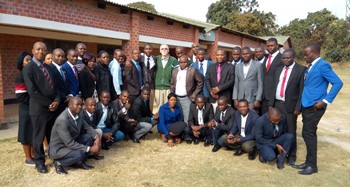Theology Class
First day of a new semester. I have been assigned to teach three courses this term – none of which I really feel quite ready to teach after 25 years away from the academic life – but this is why I have been invited to come to the United Church of Zambia University theology department, and I have promised to give it my best effort. Half the students are not here yet. The class is supposed to include about 35 young-ish men and women. Most of the students are working on their second careers, most of them hoping to enter the UCZ ordained ministry, though a few will become police, army or hospital chaplains, maybe social workers, or something similar. But, half of them are not here yet. Still traveling to Kitwe from far away – most people do not realize how large Zambia is – and some still collecting money to pay their registration fees. The UCZU is not expensive by North American standards, but it costs more to attend here than most young Zambians can comfortably pay. For whatever reason, about forty percent of the class is not present or ready to start the new semester. I am heartbroken because my initial lecture lays the foundation for what theology is all about and what tools most of us employ to think theologically … and half of my class is not here. I will have to re-teach later the lessons about openness to extra-biblical theological sources.
 I ask who in the class has ever read any theology. Not a hand goes up. These are not shy students, and they know me. I taught them basic research skills and writing last semester. Still, no one reports having ever read any theology.
I ask who in the class has ever read any theology. Not a hand goes up. These are not shy students, and they know me. I taught them basic research skills and writing last semester. Still, no one reports having ever read any theology.
I try to reassure them. “You have read biblical theology, if you have read commentaries on scripture. You have read some historical theology if you have read any Augustine, any Luther, any modern African indictment of the last century’s missionary religion.” They all breathe a little easier. I inform them we will be reading lots of different theological points of view.
I reassure them that they do theology all the time. I tell them they are all theologians. I inform them theology takes place whenever we try to make sense of what we think we believe. I tell them they are all “old hands” at doing this already. But I warn them also that the reason they have to take this class is that everyone else is doing the same thing and that if ever they go into the pulpit and make claims about God, the folks sitting out front are going to be listening and deciding whether “your theological understanding of who God is and how God regards the church and God’s creatures” is trustworthy. The students nod and begin to understand how serious, how challenging, how important – and how demanding and potentially painful – this class is going to be.
We run through the syllabus. When we get to the section about course requirements, I draw attention to the “brief statement of one or two theological beliefs with theological defense” that will be due in a few months. Everyone sort of nods, as they look at specifications of length, font size, etc. There are a couple quizzical looks, but no one asks any questions at the moment. We move on. We discuss some of the texts, some of the books our library doesn’t have, and I warn them that reading assignments will have to be fluid and might change as I search for books that will be really useful for our purposes. The class ends and everyone goes away.
Later in the day, as I sit in my office planning for my next class – a history course about modern African Christianity (something else I have to bone up on before I dare go into the classroom!) – I am interrupted by a string of visitors, each coming for the same issue.
Every student who enters asks, “Doctor Robert, what exactly does this ‘short statement of one or two theological beliefs’ mean? What do you mean “with theological defense’?”
“Well,” I reply in each case, “do you believe in God?”
“Of course!” they each respond all afternoon.
“Why?”
“Ohhh…” It begins to dawn on these university students that there is more to an educated clergy than knowing your Bible. I explain that I am trying to get them to identify other meaningful tools for examining, understanding, constructing and proclaiming their religious commitments and for appreciating other people’s sometimes very different commitments. They leave my office a little clearer about what I am asking from them but I’ll bet they are also wondering where in the world this outsider is going to lead them this semester.
I am gratified to observe that some of them are already – only a day or two into the semester – in the library … reading theology.
Little do they yet realize that this is an exercise in mutuality for me. I expect to learn as much (or more) about Zambian religious sensibilities as my students will learn from me in that classroom. Theology class cuts both ways this year.
Robert Breckenridge serves with the United Church of Zambia. His appointment is made possible by your gifts to Disciples Mission Fund, Our Church’s Wider Mission, WOC, OGHS, and your special gifts.
